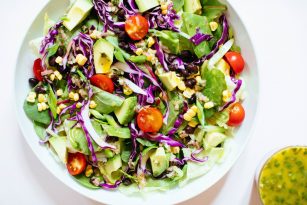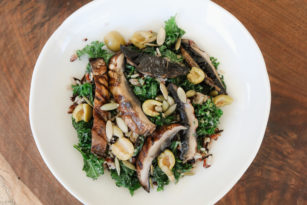“What does it mean if I crave salty foods?”, or “what does it mean if I crave sugar?”, are some of the thoughts you may have if you’ve ever experienced food cravings. There are many different cravings meanings to be aware of.
Cravings are so individual and affect each of us differently.
There are many causes of food cravings, from old habits to our emotions and even nutrient deficiencies, and it’s important to understand what may be causing yours.
When nutrient deficiencies are to blame, your body sends a message to you that it needs that nutrient, and that can often take the form of craving a specific food. Having an awareness of what you’re craving along with what may be causing it will be helpful for you to learn how to manage cravings and better provide your body with what it needs.
Learn what questions to ask to figure out if it’s a hunger-based craving or an emotion-based craving, what nutritional deficiencies may cause cravings, and how to manage them in the future.
Cravings Meanings: If you’re craving __, then it may mean…
Nutritional deficiencies are only one cause of cravings.
Craving Fats Meaning
What you’re craving: avocados, fried foods, salmon, nuts, seeds, nut butter, butter, coconut milk-based products, cheese, etc.
Craving fat may indicate your body is reaching for more calories and needs more energy. We’ve seen these cravings with clients and members who were on very low-calorie dieting programs.
Their bodies are literally starving for nutrition and energy to function normally. Because fats (all that are listed above) are the highest source of calories per gram (9kcal/1 gram), this could be an indicator of increased energy needs.
On the other hand, it could indicate that your body (especially if you’re a woman) is in need of more fat for increasing body fat percentage. This is most common with recreational athletes or those trying to get pregnant.
It may also indicate that your body needs help from healthy fats to normalize imbalances in hormones. Don’t forget that hormones are made up of fatty acids. We all need fatty acids, especially women!
Craving Salty Food Meaning
What you’re craving: salty foods like chips, popcorn, sea salt, celery, etc.
Craving salty foods may indicate that you’re dehydrated, or that you have an electrolyte imbalance.
You may also crave salty foods when you’re exceptionally stressed. Cortisol is a hormone that’s released when we’re feeling stressed. Research shows that more cortisol is released when our sodium levels are lower. By craving sodium, your body may be attempting to regulate stress (and cortisol) levels (1).
Craving Sweets Meaning
What you’re craving: sugary foods like cakes, brownies, chocolate, fruit, honey, refined sugars of any kind, etc.
Do you ever find yourself asking, “why am I craving sweets so often?”
If you’re craving sweets, it may indicate blood sugar imbalances, low chromium, heightened stress, a lack of high-quality sleep, or a hormonal imbalance. Additionally, as the example with healthful fats above, possibly a need for increased calories since sugar is easy and quick calories for our body to utilize.
It can also indicate inadequate starchy carbohydrate intake. This is especially common in those trying to avoid carbs, or those consuming a low carbohydrate diet unintentionally. The body needs these carbs for energy, and eating sweets is one of the easiest ways to get energy quickly!
We’ll often see these cravings happening late at night. If you find yourself constantly craving sweets and treats at the end of your day, you may be lacking starchy carb intake.
If chocolate is always the sweet you’re craving, it may have to do with your menstrual cycle.

Women often crave chocolate, not just for its taste, but because cocoa in nature is actually high in magnesium — a common mineral we lose during menstruation. Chocolate and cocoa also increase your serotonin levels (i.e. happy hormone), dopamine levels (i.e. feel-good hormone), and oxytocin levels (i.e. the “love” hormone).
So, you can see why we might gravitate towards chocolate around that time of the month (2).
Craving Carbs Meaning
What you’re craving: processed carbohydrates like pasta, bread, crackers, wraps, etc.
A constant craving for these types of foods may indicate a lack of the amino acid tryptophan.
Thanksgiving Day has made the amino acid tryptophan famous. Many people believe it to be responsible for the feeling of sleepiness after eating a lot of turkey. Fun fact – in actuality, the sleepiness we feel after Thanksgiving dinner is probably just the abundance of food we’re consuming and energy going towards our digestive system.
But nonetheless, when we consume carbohydrates, tryptophan levels are able to increase. When tryptophan increases, serotonin (i.e. happy hormone) increases as well.
Therefore when our carbohydrate intake is low, this can result in low mood and anxiety from the body’s inability of synthesizing tryptophan into serotonin. (3)
Craving Meat Meaning
What you’re craving: red meats like steak, beef, lamb, pork, etc.
Are you vegetarian or vegan? This may be a result of the low amount of protein you’re consuming. You can consume adequate protein from vegan or vegetarian sources, but it can be tricky to navigate on your own.
It just takes time to learn what plant foods contain the important nutrients you need. I recommend meeting with a registered dietitian to have a complete dietary assessment done to see if you’re meeting your protein and nutritional needs first, then take action from there.
As always, listen in to your body and its needs. A lesson in mindful eating I teach clients is based around the concept of food cravings vs. nutrient needs and nourishment vs. emotional eating.
If you find yourself having strong food cravings, consider practicing mindfulness during cravings or when eating to determine if the root of the craving may actually be an emotional or mental trigger.
Resources:
(1): https://www.ncbi.nlm.nih.gov/pmc/articles/PMC5575371/
(2): http://www.ncbi.nlm.nih.gov/pubmed/10524390
(3): http://www.ncbi.nlm.nih.gov/pubmed/5120086








